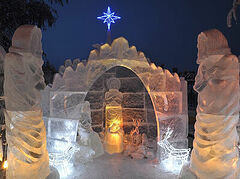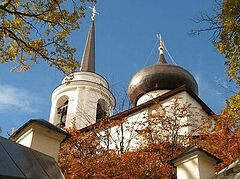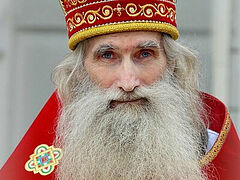Abbot Simeon (Kulagin) of the Sviyazhsk Holy Dormition Monastery talks about the providence of God in his life, about how he was drawn to monasticism, and about his spiritual experiences and meetings with his spiritual mentors.
A strange child
 Abbot Simeon (Kulagin) The school librarian thought I was a strange child. She even had to put up with me, a second-grader, coming in and asking for books on history and politics. I was just interested in everything going on around me. The thing is that my parents really loved to read. My father worked in applied sociology; he had studied at the graduate school of MSU, and my mother was also well-read. Maybe that’s why I loved to learn new things so much. By eighth grade, I knew the name of every country and capital in the world and was keenly interested in politics and the structure of the universe.
Abbot Simeon (Kulagin) The school librarian thought I was a strange child. She even had to put up with me, a second-grader, coming in and asking for books on history and politics. I was just interested in everything going on around me. The thing is that my parents really loved to read. My father worked in applied sociology; he had studied at the graduate school of MSU, and my mother was also well-read. Maybe that’s why I loved to learn new things so much. By eighth grade, I knew the name of every country and capital in the world and was keenly interested in politics and the structure of the universe.
Our poor school librarian faced more challenges a little later as I started making even more unusual requests. You see, it was 1988—the Millennium of the Baptism of Rus’, and our government, completely atheistic before that, unexpectedly “warmed” up to the Church.
 Igumen Simeon (Kulagin) I lived with my parents in Barnaul in the Altai region. We lived under the soviet authorities, so they, like most people in those years, were not church-goers. And of course, I also hadn’t the faintest clue about the Orthodox faith.
Igumen Simeon (Kulagin) I lived with my parents in Barnaul in the Altai region. We lived under the soviet authorities, so they, like most people in those years, were not church-goers. And of course, I also hadn’t the faintest clue about the Orthodox faith.
Then suddenly a whole new world opened up before me: They started showing churches on TV, with monks singing. There were shows about iconography, the services, spiritual singing—about the side of life that was previously under an unspoken ban. All of this, of course, greatly interested me—the picture of a completely unknown world had opened up before me.
I started looking for everything on this topic in our library, but I could only find atheist books. There was no Orthodox literature to speak of in those years, at least not in our school library and in the other libraries in the city. I well remember those books where you could find at least a grain of information about the Orthodox faith, including The Atheist’s Handbook, The Orthodox Dictionary, and The Old Believer’s Dictionary (of course, everything was interpreted from an atheist’s point of view).
Our librarian was terribly surprised:
“Why are you interested in that? You should be reading fairytales at your age! Here, do you want to read about the adventures of Buratino?”1
“No, thanks! Give me The Atheist’s Dictionary, please!
The librarian was highly displeased, but I was persistent, and in the end, she gave me what I wanted.
She grumbled after me:
“What a strange child!”
A Pioneer’s protest
Soon all of my classmates and I were accepted as Pioneers,2 but over the course of a year I read a lot and decided to leave the organization. On September 1, I went to school without the signature Pioneer tie, which was a shock for my teachers. One of the best schools in Barnaul, and suddenly such a protest from a Pioneer… I was upbraided in turn by my homeroom teacher, the Pioneers chairman, and finally, the principal.
If you remember your childhood, you can imagine what it means for a child to be called in to the principal’s office. She sternly asked me:
“Why don’t you want to wear the Pioneers’ tie?”
“Because I don’t want to be a Pioneer.”
“Why not?”
“Because it’s communist.”
“No, you don’t understand. It’s just a children’s organization!”
“Then why is it named for Lenin?”
“Fine! Then we’re going to call a school assembly and you can publicly explain your position!”
That was a truly scary threat for me at the time, because there were Pioneers at school who were older than me, and I absolutely did not want to publicly give a speech in front of a group of older people. I was really worried as I awaited this public trial, but, thankfully, it never happened. They gave up on me.
But we had a tradition of taking a picture together as a class every September. It was all very festive; we were glad to be another year older and that we were all together. But they told me:
“Either put on the tie or don’t come get your picture taken with us!”
I didn’t put it on, and I wasn’t in the photo. I was really offended. Our algebra teacher, who was my homeroom teacher then, slapped me with a D for the marking period.
Of course, compared with what many adults endured for the confession of their faith, my experiences at that time could be called trifles, but for a child’s heart they were very grievous.
About a year later, the entire Pioneers organization fell apart, and they all stopped wearing the tie, and then even the uniform.
How I wanted to be baptized and buy a Bible
After reading all these atheistic dictionaries, I learned there’s a book called the Bible and I wanted to find it and buy one. There was a used bookstore next to our building. It didn’t have the book I so desired, but the profiteers who were hanging out by the store showed me the Bible and set a price—twenty-five rubles, which was quite a lot at that time.
I joyfully ran to my parents and announced that I had found a Bible, which I really needed. But they, being young professionals with two children at that time, couldn’t afford to spend such an amount on a book and regarded my request as a child’s whim. Thus, I wasn’t able to get a Bible.
Then I wanted to get baptized. I remember going to the Holy Protection Church—the only one in Barnaul at that time. It was pretty far from home for a ten-year-old boy. I found out that Baptism costs 10 rubles, a cross 50 kopeks, and a candle 50 kopeks—11 rubles altogether. I asked my parents for the money, but again they didn’t support my idea. They had a small salary, and they only came to God much later.
 Holy Protection Church in Barnaul, 1990 In 1990, I was already twelve, and my grandmother agreed to get me baptized. She lived in the suburbs and said to me once:
Holy Protection Church in Barnaul, 1990 In 1990, I was already twelve, and my grandmother agreed to get me baptized. She lived in the suburbs and said to me once:
“Come out here! You wanted to get baptized—let’s get you baptized!”
A lot changed in the country in two years; new currents could be felt in everything. The government loosened its grip, and everything that used to be underground began to break out: rock music, and banned literature that used to be distributed in samizdat. The authorities stopped controlling the Baptism of their citizens, and people went to get baptized en masse. Many of my friends were baptized at that time.
I well remember how I felt after Baptism: I was on the bus, looking out the window, and I felt a wonderful peace and quiet joy in my soul. Now, having become a priest, I can explain what I felt: It was the visitation of Divine grace. I couldn’t pinpoint my feelings at that time, but I was able to connect them with Baptism, and it really sank down into my soul. Later, I repeatedly experienced such a feeling of the visitation of the grace of God when I approached the Mysteries.
I think my childhood interest in faith was the call of God, and this call led me to Baptism. Immediately after Baptism, when my mother realized my interest was serious, she bought me a Bible. You could already find them for sale then, and so I started reading the Sacred Scriptures. For an unprepared boy, it was a rather difficult text, but it was very interesting for me. That’s how I came to faith.
At that same time, a church opened next to our building and I started going there. I went alone, as my parents were completely uninterested but I really wanted to be in church.
“At the walls of the Church”
Now I understand that to truly enter the Church is hard work. I know many people who came to faith but don’t live a conscious spiritual life, don’t consciously battle with their passions. S. Fudel has a book, At the Walls of the Church. Before truly entering the Church, a person stands at the walls for a long time: The liturgical language is difficult and often incomprehensible. There are the long fasts, the fast before Communion, long services, “angry babushkas…”
The Protestants do active evangelization; they’ve developed an entire system of how to surround someone “with love,” how to retain him. We don’t have anything like that. Sometimes people say it’s not right, that we need to draw people in the same way; but I think these aren’t human flaws—all these numerous obstacles are providential. You should make an effort to enter the Church. Birds push their chicks out of the nest so they would fly. It’s the same here—you have to make an effort and prove you have serious intentions.
I had a period like this of entering the Church. I remember one funny instance in this regard.
“Lunch break”
Everyone has their own obstacles, and I had mine. Instead of “angry babushkas,” I had “lunch break.”
In my youth, there came a time when I really wanted to talk with a priest. I had accumulated a lot of questions. I went to church when there was no service, and I saw some very strict babushkas sitting there. I approached them, politely told them what I was there for, and they sent me to the baptismal chapel. There the next babushka met me. I told her the same thing, and she told me very sternly:
“There’re no priests rights now. They’re on lunch break!”
Now, having grown and become a priest, I am well aware that clergy are in the habit of having lunch and in general they have all the human habits. But at that time, this phrase really set my teeth on edge. I suddenly felt like I was in a government institution. I turned around and left without even waiting for anyone.
I had some plans, but the Lord had completely different ones
I was interested in history from early childhood. By the time I was nine, I had read all the school books, and by the time I was twelve, all the university textbooks on history, and I already knew for sure that I would be an historian when I grew up. It was very interesting for me to learn new historical facts. I read academic literature and monographs like others read detective and adventure stories.
When I went to Altai State University to study history, I developed the habit of going to church to the early Liturgy every morning before class. I really liked it.
I graduated with a history degree and started grad school—I was studying and teaching at the university at the same time. I thought that was happiness then: My hobby is also my work, and they even pay me for it. I was absolutely certain that I would be working with my beloved history until the end of my days. I wrote my thesis and was ready to defend it.
But something happened in my life that completely changed all my plans and calculations. It’s always difficult to talk about spiritual things—spiritual states and phenomena are poorly conveyed with our usual words intended for usual, everyday life. I’ll try to talk about it, but I’m not sure I’ll be able to convey what I experienced.
 Altai State University in Barnaul, 1980s
Altai State University in Barnaul, 1980s
Divine visitation
I remember the day well—June 2, 2002. I wasn’t even planning to commune then—I didn’t feel ready, but a good friend convinced me to commune. And as if to show me that the Spirit blows where It will, the Lord allowed me to experience His visitation.
After Communion, I left the St. Nicholas Church, started descending the high steps, and I had the clear physical feeling of weightlessness. I suddenly realized that I couldn’t feel my weight at all; just a little more and I would take off. It was such a strong visitation of Divine grace that I felt it physically.
When I got home, I immediately started reading the Gospel—I really wanted to read it. I started, and realized it was the first time in my life I was reading consciously. All impediments and obstacles disappeared and I began to easily understand Church Slavonic. It was such illumination, such an exalted state—which was spiritual. I wanted to pray, I wanted to read the Gospel, as if running to a spring with living water. It was a very unusual state, such a Divine visitation, that lasted three days.
My mother could see that something was happening with me but couldn’t understand what it was, and for some reason she said:
“I’m scared you’re going to go to a monastery.”
I wasn’t even thinking about a monastery then.
 Restoration of the St. Nicholas Church in Barnaul in 1993
Restoration of the St. Nicholas Church in Barnaul in 1993
Before and after
It’s difficult to describe my state then, but what happened to me divided my life into before and after. It was far from my first Communion, but it was a turning point for me: My childhood aspiration, my craving for God was realized—I entered the Church. Then I realized that all the answers to my questions on the structure of the world, all the consolation that I had previously sought in historical knowledge, I could get in the Church. The spiritual world was revealed to me, and I realized that there is a spiritual level of knowledge of the world.
After that, I even began to cool towards my beloved profession. I continued working at the university for another three years, but I already felt that I wouldn’t be working with history as I wanted to before, to the end of my life. My interest in my dissertation also began to fade—I wrote it by inertia, I but didn’t even want to defend it anymore.
I want you to understand me correctly: What happened with me absolutely does not mean that everyone should give up academia or their beloved job and go to a monastery. The Lord can call someone just as masterfully to labor in the field of science, medicine, education, anything, or to family life and a large family. I’m talking about my personal experience and personal call. This was God’s providence for me; but for someone else, providence could be completely different.
I started going to the churches in Barnaul as often as I could. Then I went on an academic trip to Moscow and I went to all the churches in the center of Moscow to pray. I felt such a strong call from God, such a strong change in my spiritual state, which, of course, had to end with a change in the circumstances of my life.






